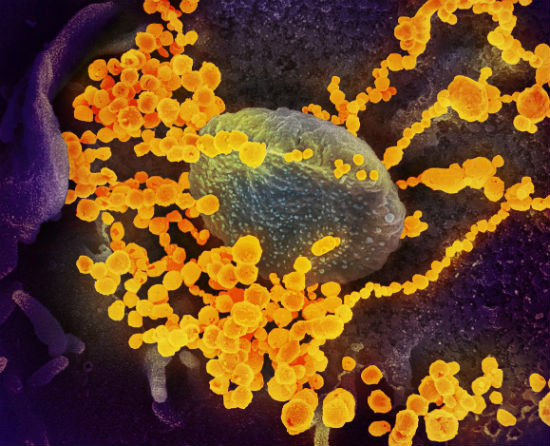
RTI, Duke Coordinate Global Effort to Identify Pathogens in Wildlife Risky to People

emerging from the surface of cells cultured in the lab. SARS-CoV-2, also known as 2019-nCoV,
is the virus that causes COVID-19. The virus shown was isolated from a patient in the U.S. Image
captured and colorized at NIAID's Rocky Mountain Laboratories in Hamilton, Montana. -- NIAID
With $814,714 in initial federal funding, RTI International and Duke University’s Human Vaccine Institute will collaborate in a global project to identify viruses and other pathogens in wildlife that could cause disease in people, such as the coronavirus responsible for the COVID-19 pandemic.
RTI and Duke will operate the Coordinating Center for 10 other newly established Centers for Research in Emerging Infectious Diseases (CREID), sponsored by the National Institute of Allergy and Infectious Diseases (NIAID), part of the National Institutes of Health.
The agency awarded 11 grants with a total first-year value of about $17 million to establish the centers and will provide about $82 million over five years to support them.
“The impact of the COVID-19 pandemic serves as a potent reminder of the devastation that can be wrought when a new virus infects humans for the first time,” said NIAID Director Anthony S. Fauci, M.D. “The CREID network will enable early warnings of emerging diseases wherever they occur, which will be critical to rapid responses. The knowledge gained through this research will increase our preparedness for future outbreaks.”
29 countries involved
CREID will be part of global network of multidisciplinary investigations into how and where viruses and other pathogens emerge from wildlife and cross into humans to cause disease.
Each center in the network will involve collaborations with peer institutions in the United States and 28 other countries. Research projects will include surveillance studies to identify previously unknown causes of febrile (fever-creating) illnesses in humans; find the animal sources of viral or other disease-causing pathogens; and determine which genetic or other changes make these pathogens capable of infecting humans.
CREID investigators also will develop reagents and diagnostic assays to improve detection of emerging pathogens and study human immune responses to new or emerging infectious agents.
The breadth of research projects in the CREID network will allow for study of disease spillover in multiple phases of the process: where pathogens first emerge from an animal host; at the borders between wild and more populated areas, where human-to-human transmission occurs; and, finally, in urban areas, where epidemic spread can occur.
Each CREID center will focus efforts on one or more regions of the world. In Central and South America, for example, studies will include investigations of several arthropod-borne viruses (“arboviruses”) including the ones that cause Zika virus disease, chikungunya and dengue. In East and Central Africa, focus pathogens will include Rift Valley fever virus and the coronavirus that causes Middle East respiratory syndrome. In West Africa, in addition to arboviruses, projects are slated on Ebola virus and Lassa virus. In Asia and Southeast Asia, investigators will conduct research on coronaviruses and arboviruses.
In every region, investigators will be poised to study any newly emerging pathogen, dubbed “pathogen X.”
RTI-Duke will be operational hub
The CREID Coordinating Center run by RTI and Duke will support network-wide activities such as data management, outbreak research response and quality control for biospecimens, assays and reagents. It will also administer a pilot research program for early career investigators.

The principal investigators for the CREID Coordinating Center will be Donald Brambilla, Ph.D., of RTI and Tony Moody, M.D., of Duke’s School of Medicine.
“Our ability to support rapid and efficient research response to an emerging infectious disease outbreak is paramount to shortening the duration and reducing morbidity and mortality,” said Brambilla, senior research statistician at RTI.

Moody, associate professor of pediatrics at Duke, said, “During the past six months, we’ve seen the impact of the COVID-19 pandemic across the globe. By creating and supporting an infrastructure that allows rapid response to infectious disease outbreaks by researchers and by leveraging what we have learned and are learning from research organizations across the globe, we aim to shorten future outbreaks.”
As the operational hub for the CREID Network, the RTI-Duke Coordinating Center team offers expertise in supporting administration and management of data and scientific programs, according to the CREID website. “The CREID CC has extensive experience in international outbreak research response, including field experience responding to complex outbreaks.”
The RTI-Duke team will also “maintain and grow existing relationships with domestic and international collaborators, including Ministries of Health and local research institutions,” according to the website. “Additionally, the team will facilitate and coordinate relevant outreach to engage new partners.”
The RTI-Duke team will support 10 CREID centers based at Scripps Research Institute; EcoHealth Alliance; University of California, Berkeley; University of California, Davis, School of Veterinary Medicine; Washington State University; Institut Pasteur; University of Texas Medical Branch, Galveston; University of Washington, Seattle; Washington University School of Medicine; and the University of Texas Medical Branch, Galveston.
